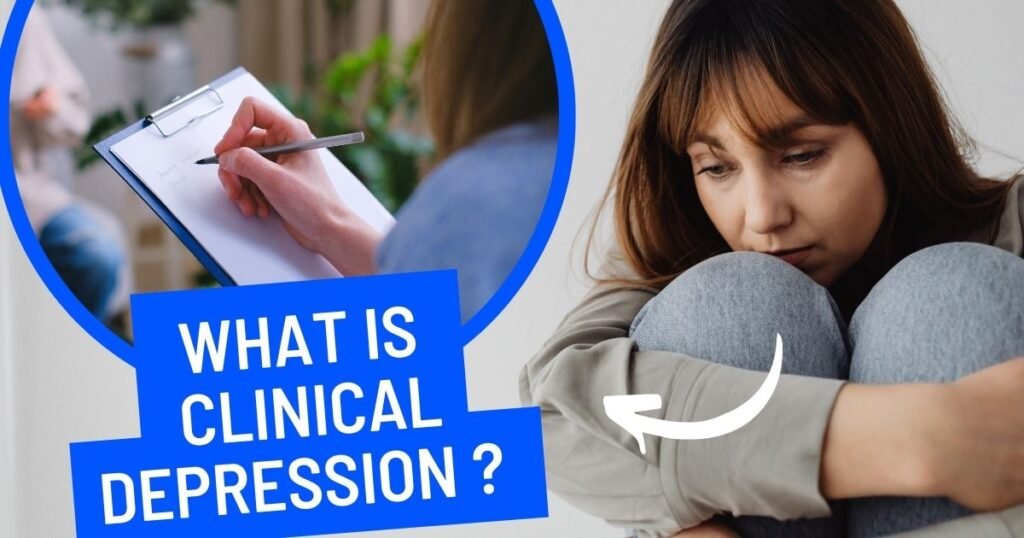Clinical depression, also known as major depressive disorder, is a common and serious mental health condition that affects how you feel, think, and behave. It can lead to a variety of emotional and physical problems, and can interfere with your daily functioning.
Symptoms of clinical depression can include persistent feelings of sadness or hopelessness, loss of interest in activities that were once enjoyable, difficulty concentrating or making decisions, changes in appetite or weight, fatigue or loss of energy, and thoughts of death or suicide.
There is no single cause of clinical depression, and it is often the result of a combination of genetic, environmental, and psychological factors. Some people may be more prone to developing clinical depression due to their family history, while others may experience it after experiencing a traumatic event or facing major life changes.
Read More: Human Brain

What is Clinical Depression
Treatment for clinical depression typically involves a combination of therapy and medication. Antidepressant medications, such as selective serotonin reuptake inhibitors (SSRIs) or tricyclic antidepressants, can help to balance chemicals in the brain that regulate mood. Psychotherapy, such as cognitive-behavioral therapy (CBT) or interpersonal therapy, can help individuals identify and change negative thought patterns and behaviors that contribute to their depression.
It is important to seek help if you are experiencing symptoms of clinical depression. It is not a sign of weakness to ask for help, and the sooner you receive treatment, the better your chances are of recovering. Your primary care doctor or a mental health professional can help you find the treatment that is right for you.
If you or someone you know is having thoughts of suicide, seek help immediately. The National Suicide Prevention Lifeline is available 24 hours a day at 1-800-273-TALK (8255).
Clinical depression is a serious, but treatable condition. With the right treatment, you can recover and return to a fulfilling life.
Walk in Clinic Depression
Walk-in clinics are becoming an increasingly popular option for individuals seeking help for mental health issues such as depression. These clinics provide easy access to mental health professionals without the need for an appointment. They also offer a more convenient and less intimidating alternative to traditional mental health facilities.
Depression is a serious mental health condition that can affect people of all ages and backgrounds. It is characterized by feelings of sadness, hopelessness, and a lack of interest in activities that were once enjoyed. It can also lead to Clinical Depression physical symptoms such as fatigue, changes in appetite and sleep patterns, and difficulty concentrating.
At a walk-in clinic, individuals can receive a diagnosis and treatment for depression from a mental health professional. This may include therapy, medication, or a combination of both. Therapy is a form of talk therapy that aims to help individuals understand their thoughts and feelings and develop coping mechanisms to Clinical Depression manage them. Medication, such as antidepressants, can help to alleviate the symptoms of depression.
Walk-in clinics also provide a safe and confidential space for individuals to discuss their mental health concerns. They offer a judgement-free environment where individuals can receive the help they need without fear of stigma.

It’s important to note that walk-in clinics may not always be the best option for individuals with more severe forms of depression or those who require more specialized care. In those cases, it may be more appropriate to seek help from a mental health specialist or a hospital-based clinic.
In conclusion, walk-in clinics are a valuable resource for individuals seeking help for depression. They provide easy access to mental health professionals, offer a more convenient and less intimidating alternative to traditional mental health facilities and provide a safe and confidential space for individuals to discuss their mental health concerns. If you or someone you know is struggling with depression, consider visiting a walk-in clinic for help.
Depression Treatment Clinic of San Antonio
Depression is a common mental health condition that affects millions of people worldwide. In San Antonio, Texas, there are several treatment clinics that specialize in helping individuals struggling with depression. These clinics offer a range of services, including counseling, therapy, medication management, and support groups.
One of the most well-known depression treatment clinics in San Antonio is the Center for Health Care Services (CHCS). CHCS offers a variety of services, including individual and group therapy, medication management, and case management. They also have specialized programs for veterans, youth, and individuals with co-occurring disorders.
Another popular clinic in San Antonio is the Mental Health Association of San Antonio (MHASA). MHASA offers a wide range of services, including counseling, therapy, medication management, and support groups. They also have specialized programs for veterans and individuals with co-occurring disorders.
The San Antonio Behavioral Health Care Consortium (SABHCC) is also a great resource for individuals struggling with depression. They offer a range of services, including individual and group therapy, medication management, and case management. They also have specialized programs for veterans and individuals with co-occurring disorders.
The San Antonio Military Medical Center (SAMMC) also offers mental health services for veterans and active duty military personnel. They provide counseling, therapy, medication management, and support groups.
In conclusion, San Antonio, Texas, offers several treatment clinics that specialize in helping individuals struggling with depression. These clinics offer a range of services, including counseling, therapy, medication management, and support groups. With a variety of options, it is important for individuals to find the right clinic that best fits their needs. It is always best to consult with a medical professional before making any decision on treatment.
Depression Bipolar Clinic Fort Collins
Depression and bipolar disorder are two common mental health conditions that can greatly impact an individual’s daily life. These conditions are often complex and require specialized treatment and care. In Fort Collins, Colorado, there are several clinics that specialize in the treatment of depression and bipolar disorder.

One such clinic is the Depression and Bipolar Clinic at the University of Colorado Health (UCHealth) in Fort Collins. This clinic offers a range of services to individuals living with depression and bipolar disorder. The clinic’s team of specialists includes psychiatrists, psychologists, and social workers who work together to provide comprehensive care.
The clinic offers both medication management and talk therapy for individuals with depression and bipolar disorder. Medication management involves the use of antidepressants and mood stabilizers to help alleviate symptoms. Talk therapy, also known as psychotherapy, is a form of therapy that aims to help individuals understand their thoughts and feelings and develop coping mechanisms to manage them.
The clinic also offers specialized treatment for individuals with rapid cycling bipolar disorder, which is a subtype of bipolar disorder characterized by four or more episodes of mania, hypomania, or depression in a 12-month period. This specialized treatment often involves a combination of medication and talk therapy.
One of the key benefits of seeking treatment at a specialized clinic such as the Depression and Bipolar Clinic at UCHealth is that patients receive care from a team of experts who understand the complexities of these conditions. They are well-versed in the latest research and treatment options and have the experience to provide the best possible care.
In addition to the specialized treatment, the clinic also offers support groups and educational resources to help individuals and their families better understand and manage these conditions. They also have a crisis team available 24/7.
In conclusion, the Depression and Bipolar Clinic at UCHealth in Fort Collins is a valuable resource for individuals living with depression and bipolar disorder. The clinic’s team of specialists offers comprehensive care, including medication management and talk therapy, and specialized treatment for rapid cycling bipolar disorder. They also offer support groups and educational resources to help individuals and their families better understand and manage these conditions. If you or someone you know is struggling with depression or bipolar disorder, consider seeking treatment at this specialized clinic.
Depression Clinics Near Me
Depression is a common mental health condition that can greatly impact an individual’s daily life. It is characterized by feelings of sadness, hopelessness, and a lack of interest in activities that were once enjoyed. Individuals who are struggling with depression may benefit from seeking help at a specialized clinic.
There are many depression clinics located throughout the country, and it is likely that there are several options available in your local area. To find a depression clinic near you, you can start by searching online or asking your primary care physician for recommendations. You can also check with your insurance company to see which clinics are covered under your plan.
When searching for a depression clinic, it is important to consider the types of services that are offered. Some clinics may specialize in medication management, while others may focus on talk therapy or a combination of both. It is also important to consider the qualifications and experience of the clinic’s staff.
Many depression clinics offer both individual and group therapy sessions. Individual therapy is a form of talk therapy that aims to help individuals understand their thoughts and feelings and develop coping mechanisms to manage them. Group therapy allows individuals to share their experiences with others who are going through similar struggles and can provide a sense of community and support.
Medication management is also a common treatment option at depression clinics. Antidepressant medications can help to alleviate symptoms of depression, but it’s important to note that medication alone may not be sufficient to treat the condition. It’s also important to work with a healthcare professional who can monitor side effects and adjust the dosage as needed.
In addition to traditional therapy, some clinics also offer alternative treatments such as mindfulness-based therapies, art therapy or music therapy.
In conclusion, there are many depression clinics located throughout the country that can provide specialized treatment and care for individuals struggling with depression. When searching for a depression clinic, it is important to consider the types of services that are offered, the qualifications and experience of the clinic’s staff and if they offer alternative treatment methods. With the right help, individuals with depression can manage their symptoms and improve their quality of life.
Anxiety and Depression Clinic Near
Anxiety and depression are two of the most common mental health conditions, affecting millions of people worldwide. Finding a reputable clinic that specializes in treating these conditions can be a daunting task, but it’s important to remember that help is available.
One of the best ways to find a clinic near you is to do a quick online search. Many clinics have websites that provide detailed information about their services, including the types of treatments they offer and the qualifications of their staff. You can also use online directories to find clinics in your area that specialize in treating anxiety and depression.
Another great way to find a clinic is to ask your primary care physician for a referral. They may have a list of clinics that they trust and recommend. Additionally, many insurance companies have online directories that list providers that are in-network, which can be a great resource to find clinics near you.
Here are some of the common types of clinics that can help with anxiety and depression:Psychiatrist clinics: These clinics are led by a medical doctor who specializes in treating mental health conditions. They can prescribe medications and provide therapy.
Psychologist clinics: These clinics are led by a licensed therapist who specializes in providing therapy and counseling.Community health centers: These centers provide a range of mental health services, including therapy and medication management, to individuals regardless of their ability to pay.Crisis hotlines: These hotlines provide immediate emotional support and resources to people in crisis.

Read More: Clinical Depression
In conclusion
Finding a reputable clinic that specializes in treating anxiety and depression can be a daunting task, but there are many resources available to help you find a clinic near you. It’s important to remember that help is available and to not hesitate to seek it. Always consult with a medical professional before making any decision on treatment.






